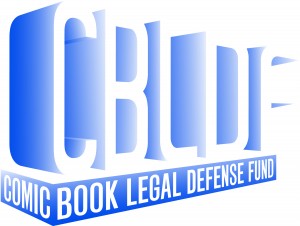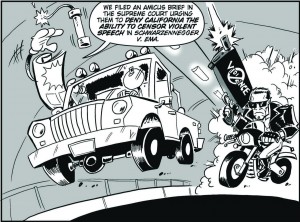The Comic Book Legal Defense Fund today announces that it is forming a coalition to support the legal defense of an American citizen who is facing criminal charges in Canada that could result in a mandatory minimum sentence of one year in prison for comics brought into the country on his laptop. This incident is the most serious in a trend the CBLDF has been tracking involving the search and seizure of the print and electronic comic books carried by travelers crossing borders.
CBLDF Executive Director Charles Brownstein says, “Although the CBLDF can’t protect comic fans everywhere in every situation, we want to join this effort to protect an American comic fan being prosecuted literally as he stood on the border of our country for behavior the First Amendment protects here, and its analogues in Canadian law should protect there.”
The CBLDF has agreed to assist in the case by contributing funds towards the defense, which has been estimated to cost $150,000 CDN. The CBLDF will also provide access to experts and assistance on legal strategy. The CBLDF’s efforts are joined by the recently re-formed Comic Legends Legal Defense Fund, a Canadian organization that will contribute to the fundraising effort. Please contribute to this endeavor by making a tax deductible contribution here.
The facts of the case involve an American citizen, computer programmer, and comic book enthusiast in his mid-twenties who was flying from his home in the United States to Canada to visit a friend. Upon arrival at Canadian Customs a customs officer conducted a search of the American and his personal belongings, including his laptop, iPad, and iPhone. The customs officer discovered manga on the laptop and considered it to be child pornography. The client’s name is being withheld on the request of counsel for reasons relating to legal strategy.
The images at issue are all comics in the manga style. No photographic evidence of criminal behavior is at issue. Nevertheless, a warrant was issued and the laptop was turned over to police. Consequently, the American has been charged with both the possession of child pornography as well as its importation into Canada. As a result, if convicted at trial, the American faces a minimum of one year in prison. This case could have far reaching implications for comic books and manga in North America.
The CBLDF’s Board of Directors voted unanimously to aid the case by raising funds to contribute to the defense and to help the defense with strategy and expert resources.
Brownstein says, “This is an important case that impacts the rights of everyone who reads, publishes, and makes comics and manga in North America. It underscores the dangers facing everyone traveling with comics, and it can establish important precedents regarding travelers rights. It also relates to the increasingly urgent issue of authorities prosecuting art as child pornography. While this case won’t set a US precedent, it can inform whatever precedent is eventually set. This case is also important with respect to artistic merit in the Canadian courts, and a good decision could bring Canadian law closer to US law in that respect. With the help of our supporters, we hope to raise the funds to wage a fight that yields good decisions and to create tools to help prevent these sorts of cases from continuing to spread.”
Find out more on the case here. To help support the case, you can make a monetary contribution here.
About CBLDF
The Comic Book Legal Defense Fund was founded in 1986 as a 501 (c) 3 nonprofit organization dedicated to the preservation of First Amendment rights for members of the comics community. They have defended dozens of Free Expression cases in courts across the United States, and led important education initiatives promoting comics literacy and free expression. For additional information, donations, and other inquiries call 800-99-CBLDF or visit them online at www.cbldf.org.
About CLLDF
The Comic Legends Legal Defense Fund was founded in 1987 to raise money for the defense of a Calgary, Alberta comic shop whose owners were charged with selling obscene materials. The CLLDF has since been maintained on an ad hoc basis to provide financial relief for Canadian comics retailers, publishers, professionals, or readers whose right to free speech has been infringed by civil authorities. Largely dormant since the early 1990s, the CLLDF is reforming to provide support for this case, and reorganizing to ensure that help will be readily available for future cases involving Canadian citizens or authorities. To help the CLLDF in this mission, please go to www.clldf.ca.
Read more →



